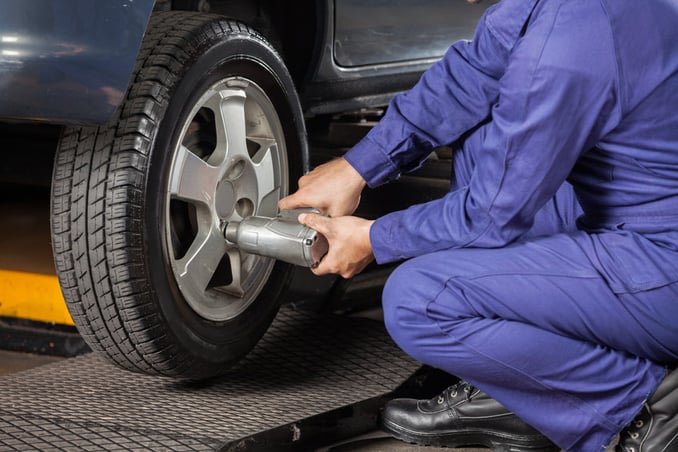Experience Accuracy with GMC Tire Service at Morris Tires
Experience Accuracy with GMC Tire Service at Morris Tires
Blog Article
Tire Solution: The Effect of Climate Condition
When it involves making sure optimal efficiency and safety when traveling, recognizing the impact of weather on tire service is crucial. From scorching warmth to icy roads, each climate element can significantly influence tire functionality and general driving experience. By diving right into the results of differing climate condition on tires, chauffeurs can obtain useful insights that may improve their automobile's efficiency and long life. In this conversation, we will certainly discover the elaborate relationship between climate problems and tire service, shedding light on the value of weather-specific tire maintenance techniques and factors to consider.
Heat and Tire Efficiency
When subjected to high temperatures, tires experience adjustments in efficiency that can dramatically affect car safety and security and handling. The heat created from extended driving or hot weather conditions causes the tire rubber to soften, leading to reduced walk life and increased wear.

Winter Impacts
Cold weather problems can have a considerable impact on tire efficiency and safety. In cool weather condition, tires might additionally shed air stress a lot more swiftly, which can affect managing and fuel effectiveness.
To alleviate the impacts of winter on tires, it is crucial to consistently check tire stress and inflate them to the supplier's advised levels. Making use of winter or all-season tires designed for winter problems can additionally improve traction and grip on icy or snowy roadways. Correct tire upkeep, including routine evaluations for wear and damage, becomes much more vital throughout chillier months to guarantee optimum efficiency and security.
Rainy Issues Influence
During rainy problems, tire performance and security can be significantly influenced by the damp road surfaces and reduced exposure. The tread pattern of tires plays a vital role in preserving grip on wet roads. Tires with worn-out treads are extra prone to hydroplaning, where a layer of water accumulates between the tire and the roadway surface, bring about loss of grip. To battle this, chauffeurs should regularly check their tires for sufficient walk deepness and take into consideration investing in tires specifically developed for damp problems.
In addition, rainy weather can likewise lower visibility, making it challenging for chauffeurs to see the road in advance clearly (GMC Tire Service). In such problems, it is crucial to change driving speeds appropriately and maintain a risk-free adhering to range to permit unexpected quits. Correctly inflated tires can also help in keeping control on damp roadways by providing site link much better handling and grip
Snow and Tire Safety And Security
Snow-covered roads position special obstacles for chauffeurs, stressing the relevance of correct tire option and maintenance. When driving in snowy conditions, having the ideal tires can make a significant difference in security and performance. Winter months tires are developed with special rubber compounds and tread patterns to give much better grip on snow and ice compared to all-season tires. The much deeper treads and sipes of wintertime tires assist grasp the road better, decreasing the risk of slipping and moving.

Furthermore, drivers should consider setting up tire chains in extreme snowy conditions. Tire chains offer additional grip by grasping the snow and ice, improving security and control. Nevertheless, it is necessary to adhere to manufacturer guidelines when mounting and utilizing tire chains to avoid damage to the tires and vehicle. By selecting the right tires, keeping correct rising cost of living, and thinking about extra grip aids like tire chains, vehicle drivers can boost their safety and security when navigating snow-covered roads.
Weather-Related Tire Upkeep
When encountered with various climate condition, correct tire maintenance ends up being an essential element of lorry security and performance. Weather-related tire maintenance incorporates an array of practices targeted at ensuring optimal tire function and long life in different climate scenarios. One vital element of weather-related tire maintenance is tire stress policy. Rising and fall temperature levels can cause tire stress to differ, impacting traction and fuel effectiveness. On a regular basis adjusting and checking tire pressure according to maker recommendations is crucial for risk-free driving in changing weather. In addition, tire tread depth plays a considerable role in handling different climate aspects. Tires with ample step depth offer much better hold on wet or icy roadways, lowering the danger of skidding or hydroplaning. When step wear gets to a certain depth is vital for preserving grip and security in unfavorable weather, examining tire walk consistently and replacing tires. By focusing on weather-related tire maintenance, chauffeurs can boost safety, improve automobile performance, and extend the life-span of their tires.
Verdict
In verdict, weather conditions have a considerable influence on tire performance and security. From warm impacting tire stress and put on to cool weather condition decreasing traction, it is crucial to consider the weather when preserving and making use of tires.
In this conversation, we will discover the complex Recommended Reading partnership between weather condition problems and tire solution, shedding light on the significance of weather-specific tire maintenance practices and considerations.

Report this page